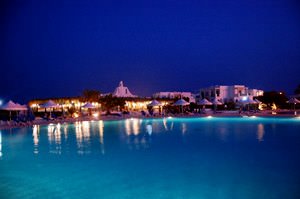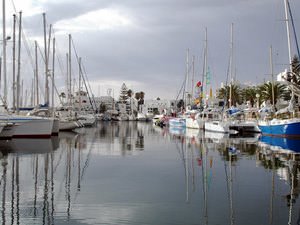
Tunisia is a republic whose legislation is based on her Constitution. Adopted in 1959, it is even today still periodically amended and updated. Tunisia is a unitary state with provincial administrative division. In total, there are twenty-three separate provinces in the Country today. At the head of the leadership is the President. It should be noted that his rights in the Republic are quite extensive, which is very unusual for modern republics. The form of government is presidential. The political regime is moderate type authoritarian rule. It is worth noting that the President is not only the Head of State of Tunisia, but he also occupies a leading position in the highest executive body. In addition, the President represents the republic in the international arena, participates in various international negotiations, and defends the interests of his people. He is also the commander-in-chief of the Armed Forces of Tunisia.
Tunisia is dominated by a subtropical climate. The Mediterranean Sea is the main influence on the formation of weather conditions. Summer in the …
Read further
According to the Constitution, a person who has already reached the age of forty, but not older than 70 years is eligible to run for the presidency. Elections are done by secret ballot of the local population. It is worth noting that before the adoption of the Constitution in Tunisia, women did not have the right to vote. However, in 1959 the rights of men and women in the political sphere were equaled. The term of office of the President is 5 years. At the same time, according to the legislation, the same individual can hold the office of the President of the country for not more than three terms. Executive power is exercised not only by the President, but also by the government. At the head of the government is the Prime Minister, who is personally appointed by the President. In addition, the President has the right to dismiss the Prime Minister at any time, especially if the parliament requires it. All Ministers of relevant Ministries are also elected by the President of the Country.
Legislative power belongs to the Parliament. It in turn, has a unicameral structure, called the National Assembly. The President has the right to reject any law adopted by Deputies of the Parliament. The procedure provides for the return of the bill to completion within a two-week period. It is worth noting that the parliament has some control over the government, however, experts refer t it as a formality. To state it more clearly, the Parliament answers only to the President of Tunisia. Election of new deputies is conducted every 5 years. To date, the Parliament has more than 180 members. Only persons who have reached the age of twenty years can participate in the election of deputies to the parliament. At the same time, an obligatory condition is providing proof of being a citizen of Tunisia. In addition, the citizenship status must have been received over a minimum of five years period. With regards to social and economic matters, legislative bodies are assisted by a specially created specialized advisory body. Copyright www.orangesmile.com
The transport infrastructure in Tunisia is quite well developed. The most popular form of public transportation is buses. Depending on the carrier’s …
Read further
In accordance with the Constitution, since the gaining of independence by the republic, a multi-party system began to dominate the Tunisian political arena. This helped to create a much stable political climate, thereby reducing the occurrence of serious public unrests. Every year, the opposition lays out its political manifesto and makes a significant contribution towards the discussion and the formation of state policies, including the external one. The opposition parties are the Progressive Democratic Party and the Democratic Forum, which upholds the rights and freedoms of the working population of Tunisia. The “Democratic Constitutional Union Party” has been in power for the past several years. It is worth noting that this political party was not long ago (in last quarter of the century) considered the only legal one in the country, having being able to garner a stable number of followers among the local population. Currently, it is the deputies of this particular party that play the leading role in shaping the political future of the republic.
![Monastir Marina Monastir Marina]()
The Constitution of the Country made provision for an independent court. Each Judge is personally appointed by the President of the Republic. The supreme council of the magistracy is responsible for proposing candidates. The main court in the country is the Supreme Court, followed by a state security court and a military court. There are also other courts in the country such as the appellate courts, central judicial bodies, cassation courts, the General Prosecutor’s Office, as well as cantonal courts. The Tunisian Armed Forces has more than 35,000 personnel. The gendarmerie, which has more than 2500 personnel, helps to maintain law and order within the country. Annually, Tunisia spends at least 2% of GDP on security. The main part of the Armed Forces is the land forces. The Air Force and the National Guard are also present.
Tunisia guide chapters
1
2
3
4
5
6
7
 Tunisia is a republic whose legislation is based on her Constitution. Adopted in 1959, it is even today still periodically amended and updated. Tunisia is a unitary state with provincial administrative division. In total, there are twenty-three separate provinces in the Country today. At the head of the leadership is the President. It should be noted that his rights in the Republic are quite extensive, which is very unusual for modern republics. The form of government is presidential. The political regime is moderate type authoritarian rule. It is worth noting that the President is not only the Head of State of Tunisia, but he also occupies a leading position in the highest executive body. In addition, the President represents the republic in the international arena, participates in various international negotiations, and defends the interests of his people. He is also the commander-in-chief of the Armed Forces of Tunisia.
Tunisia is a republic whose legislation is based on her Constitution. Adopted in 1959, it is even today still periodically amended and updated. Tunisia is a unitary state with provincial administrative division. In total, there are twenty-three separate provinces in the Country today. At the head of the leadership is the President. It should be noted that his rights in the Republic are quite extensive, which is very unusual for modern republics. The form of government is presidential. The political regime is moderate type authoritarian rule. It is worth noting that the President is not only the Head of State of Tunisia, but he also occupies a leading position in the highest executive body. In addition, the President represents the republic in the international arena, participates in various international negotiations, and defends the interests of his people. He is also the commander-in-chief of the Armed Forces of Tunisia.
 The Constitution of the Country made provision for an independent court. Each Judge is personally appointed by the President of the Republic. The supreme council of the magistracy is responsible for proposing candidates. The main court in the country is the Supreme Court, followed by a state security court and a military court. There are also other courts in the country such as the appellate courts, central judicial bodies, cassation courts, the General Prosecutor’s Office, as well as cantonal courts. The Tunisian Armed Forces has more than 35,000 personnel. The gendarmerie, which has more than 2500 personnel, helps to maintain law and order within the country. Annually, Tunisia spends at least 2% of GDP on security. The main part of the Armed Forces is the land forces. The Air Force and the National Guard are also present.
The Constitution of the Country made provision for an independent court. Each Judge is personally appointed by the President of the Republic. The supreme council of the magistracy is responsible for proposing candidates. The main court in the country is the Supreme Court, followed by a state security court and a military court. There are also other courts in the country such as the appellate courts, central judicial bodies, cassation courts, the General Prosecutor’s Office, as well as cantonal courts. The Tunisian Armed Forces has more than 35,000 personnel. The gendarmerie, which has more than 2500 personnel, helps to maintain law and order within the country. Annually, Tunisia spends at least 2% of GDP on security. The main part of the Armed Forces is the land forces. The Air Force and the National Guard are also present. 

